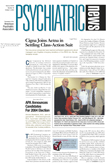New data indicate that the use of standing PRN orders may expose psychiatric inpatients to unnecessary psychotropic medications.
PRN—an abbreviation for the Latin term “pro re nata” or “as needed”—refers to written orders for benzodiazepines or antipsychotics to be given to patients by nursing staff at the nurses’ discretion or at the patient’s request. This is in contrast to standard, scheduled medications or “now” orders—one-time orders written for a specific purpose.
PRN orders are usually written to prevent or limit agitation, anxiety, and physical aggression.
Psychiatrists at the Arkansas State Hospital in Little Rock took advantage of a period from late 1999 through early 2000 during which the hospital banned PRN orders for psychotropic medications, allowing only one-time “now” orders and the standard orders for scheduled medications.
“It was a very dramatic shift in a single hospital policy,” said Purushottam Thapa, M.B.B.S., M.P.H., an assistant professor of psychiatry at the University of Arkansas for Medical Sciences in Little Rock and a staff psychiatrist at the Arkansas State Hospital. “Because of this shift, we were able to look at the frequency of unscheduled orders prior to the change and compare that with the frequency after the policy shift,” Thapa told Psychiatric News.
“What we found was clearly a dramatic reduction in the use of unscheduled psychotropic medications—greater than a 40 percent reduction.”
Thapa and his colleagues reported their findings in the September issue of Psychiatric Services. The study was funded by the Stanley Foundation and the Center for Mental Health Care Research of the National Institutes of Health.
Opportunity Knocks
Arkansas State Hospital (joining others across the country that had taken the same step) made the policy change November 1, 1999, in response to administrators’ admittedly conservative interpretation of guidelines from the Center for Medicare and Medicaid Services (CMS).
Hospital administrators believed that CMS guidelines required that “nonscheduled psychotropic medications that were deemed necessary for symptomatic management of patients require the approval of a physician as a ‘now’ order.”
The wording of the guideline seemed to preclude writing a PRN order for a psychotropic medication. However, CMS later clarified the guidelines, allowing the use of PRN orders for psychotropic medications. The hospital rescinded its ban on PRN orders in late February 2000.
Thapa and his colleagues took advantage of the opportunity to examine the frequency of nonscheduled psychotropic medication use before the policy change (both PRN and “now” orders) and while the ban was in effect (only “now” orders).
“The underlying concern at the time—among the psychiatrists and the staff—was that the delay caused by having to contact one of the physicians for a ‘now’ order might result in patients getting a bit out of hand or too agitated,” Thapa said. “The concern was that it would result in an increase in the use of seclusion and restraint for incidents of aggression.”
Unexpected Results Raise Questions
Thapa and his colleagues were able to collect data retrospectively on medication orders, as well as the use of seclusion and restraint and any events involving aggression on the part of patients.
“We did not see any increase in adverse events when staff lost the option of PRN orders,” Thapa explained. Iin fact, the team found an interesting trend in the use of seclusion and restraint, although the number of times they were used during each period studied was low, making it impossible to reach statistical significance.
“In terms of just numbers, though,” Thapa said, “the use of seclusion and restraint actually decreased.”
During the period when PRN orders were not allowed—resulting in the 47 percent reduction in unscheduled medication orders—the number of times seclusion was utilized to manage patient behavior decreased from 48 events to 41 events, and the use of restraints was cut in half, from eight to four times.
“Clearly this was reassuring,” Thapa continued, “but essentially, then, one could argue whether the PRN orders are really necessary.” In fact, Thapa and his colleagues wrote, “The results of our study thus raise the uncomfortable question of whether PRN orders are for the benefit of the patient or the staff.”
Thapa noted several limitations in the study. At Arkansas State Hospital, staff psychiatrists are in the hospital 24 hours a day, seven days a week. This makes obtaining a “now” order relatively easy and quick for the staff. On units where a psychiatrist must be paged or called to get an order, the increased amount of time necessary to do so becomes a significant variable.
“What we really need to think about is that in selected patients, with certain circumstances, having the ability to write PRN orders would be beneficial for the staff and helpful for the patient,” Thapa told Psychiatric News. “But by not really thinking about it—with no controls or restrictions on PRN orders—we just kind of reflexively throw in a PRN order or two—perhaps whether the patient needs it or not. We really need to re-evaluate this and, if PRN orders are to be used, then I think they should be used very judiciously.”
Many hospitals across the country, he noted, have attached restrictions to PRN orders—for example, time limits that cause all PRN orders to expire in three days unless re-evaluated and reordered by the physician. In addition, some institutions now look for appropriateness of PRN orders for specific patient conditions.
Thapa and his coauthors believe that “given the objective of regulatory bodies to minimize the use of ‘chemical restraints’ in this population of vulnerable patients, these findings have important policy implications.”
Psychiatr Serv 2003 54 1282
